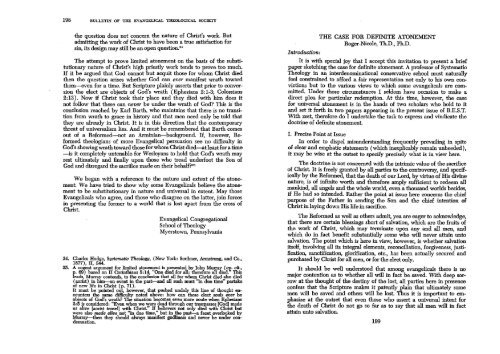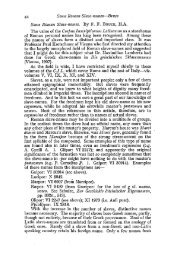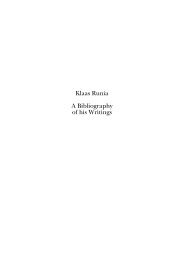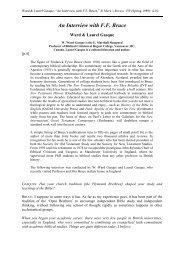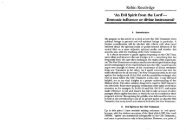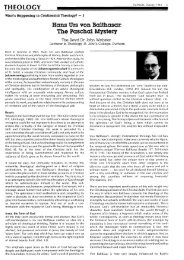Roger Nicole, "The Case For Definite Atonement,"
Roger Nicole, "The Case For Definite Atonement,"
Roger Nicole, "The Case For Definite Atonement,"
You also want an ePaper? Increase the reach of your titles
YUMPU automatically turns print PDFs into web optimized ePapers that Google loves.
198 BULLETIN OF THE EVANGELICAL THEOLOGICAL SOCIETY<br />
the question does not concern the nature of Christ's work. But<br />
admitting the work of Christ to have been a true satisfaction for<br />
sin, its design may still be an open question. 24<br />
<strong>The</strong> attempt to prove limited atonement on the basis of the substitutionary<br />
nature of Christ's high priestly work tends to prove too much.<br />
If it be argued that God cannot but acquit those for whom Christ died<br />
then the question arises whether God can ever manifest wrath toward<br />
them-even for a time. But Scripture plainly asserts that prior to ccinversion<br />
the elect are objects of God's wrath (Ephesians 2:1-3; Colossians<br />
2:13). Now if Christ took their place and they died with him does it<br />
not follow that these can never be under the wrath of God? This is the<br />
conclusion reached by Karl Barth, who maintains that there is no transition<br />
from wrath to grace in history and that men need only be told that<br />
they are already in Christ. It is in this direction that the contemporary<br />
threat of universalism lies. And it must be remembered that Barth comes<br />
out of a Reformed-not an Arminian-background. If, however, Reformed<br />
theologians of more Evangelical persuasion see no difIiculty in<br />
God's shOwing wrath toward those fO'l" whom Christ died-at least for a time<br />
-is it completely untenable for Wesleyans to hold that God's wrath may<br />
rest ultimately and finally upon those who tread underfoot the Son of<br />
God and disregard the sacrifice made on their behalf?25<br />
We began with a reference to' the nature and extent of the atonement.<br />
We have tried to show why some Evangelicals believe the atonement<br />
to be substitutionary in nature and universal in extent. May those<br />
Evangelicals who agree, and those who disagree on the latter, join forces<br />
in presenting the former to a world that is lost apart from the cross of<br />
Christ.<br />
Evangelical Congregational<br />
School of <strong>The</strong>ology<br />
Myerstown, Pennsylvania<br />
24. Charles Hodge, Systematic <strong>The</strong>ology, (New York: Scribner, Armstrong, and Co.,<br />
1877), II, 544. ,<br />
25. A cogent argument for limited atonement is presented by John Murray (or,. cit.,<br />
p. 69) based on II Corinthians 5:14, "One died for all: therefore all died.' This<br />
leads, Murray contends, to the conclusion that all for whom Christ died also died<br />
(aorist) in him-an event in the past-and all such must "in due time" partake<br />
of new life in Christ (p. 71).<br />
It must be pointed out, however, that pushed unduly this line of thought encounters<br />
the same difficulty noted above: how can these elect souls ever be<br />
objects of God's wrath? <strong>The</strong> situation becomes even more acute when Ephesians<br />
2,5 is considered: "Even when we were dead through our tresspasses [God] made<br />
us alive [aorist tensel] with Christ." If believers not only died with Christ but<br />
were also made alive not "in due time," but in the past-a facet overlooked by<br />
Murray-then they should always manifest godlineSs and never be under condemnation.<br />
Introduction:<br />
THE CASE FOR DEFINITE ATONEMENT<br />
<strong>Roger</strong> .<strong>Nicole</strong>, Th.D., Ph.D.<br />
It is with special joy that I accept ,this invitation to present a brief<br />
paper sketching the case for definite atonement. A professor of Systematic<br />
<strong>The</strong>ology in an interdenominational conservative school must naturally<br />
feel constrained to afford a fair representation not only to his own convictions<br />
but to the various views to which some evangelicals are committed.<br />
Under those circumstances I seldom have occasion to make a<br />
direct plea for particUlar redemption. At this time, however, the case<br />
for universal atonement is in the hands of two scholars who hold to it<br />
and set it forth in two papers appearing in the present issue of B.E.S.T.<br />
With zest, therefore do I undertake the task to express and vindicate the<br />
doctrine of definite atonement.<br />
I. Precise Point at Issue<br />
In order to dispel misunderstanding frequently prevailing in, spite<br />
of clear and emphatic statements (which inexplicably remain unheeded),<br />
it may be wise at the outset to specify precisely what is in view here.<br />
<strong>The</strong> doctrine is not concerned with the intrinsic value of the sacrifice<br />
of Christ. It is freely granted by all parties to the controversy, and specifically<br />
by the Reformed, that the death of our Lord, by virtue of His divine<br />
nature, is of infinite worth and therefore amply sufficient to redeem all<br />
mankind, all angels and the whole world, even a thousand worlds besides,<br />
if He had so intended. Rather the point at issue here concerns the chief<br />
purpose of the Father in sending the Son and the chief intention of<br />
Christ in laying down His life in sacrifice.<br />
<strong>The</strong> Reformed as well as others admit, yea are eager to acknowledge,<br />
that there are certain blessings short of salvation, which are the fruits of<br />
the work of Christ, which may terminate upon any and all men, and<br />
which do in fact benefit substantially some who will never attain unto<br />
salvation. <strong>The</strong> point which is here in view, however, is whether salvation<br />
itself, involving all its integral elements, reconciliation, forgiveness, justification,<br />
sanctification, glorification, etc., has been actually secured and<br />
purchased by Christ for all men, or for the elect only.<br />
It should be well understood that among evangelicals there is no<br />
major contention as to whether all will in fact be saved. With deep sorrow<br />
at the thought of the destiny of the lost, all parties here in presence<br />
confess that the Scripture makes it patently plain that ultimately some<br />
men will be saved and others will be lost. Thus it is important to emphasize<br />
at the outset that even those who assert a universal intent for<br />
the death of Christ do not go so far as to say that all men will in fact<br />
attain unto salvation.<br />
199
202 BULLETIN OF THE EVANGELICAL THEOLOGICAL SOCIETY<br />
actually saves no one. This would appear derogatory tOo Christ and repugnant<br />
tOo Scripture. A conditional impetration is really nOo impetration<br />
at all.<br />
5. Saving faith, being the gift of God (Acts 13:48; 18:27; Phil. 1:29,<br />
etc. ), is granted to man as a fruit of the saving work of Christ. If this work<br />
is universal in its scope, it is difficult to see why faith is not conferred<br />
upon all men. Yet it is patently plain that all men do not believe, and the<br />
conclusiQn fQllQWS that the wQrk of Christ, as well as its fruitiOon in faith,<br />
is designed for the redeemed.<br />
6. Particular redemption is an inevitable implicate of a recognitiQn<br />
of the penal substitutionary nature Qf the atonement. Now this vicarious<br />
nature is a common tenet of the evangelical faith. And if we want to<br />
aVQid the shoals of outright universalism, definiteness involves that the<br />
work of Christ was intended tOo terminate redemptively uPOon a part only<br />
of mankind, variously named His people, His Church, His body, His<br />
sheep, the elect. In this view the remainder Oof mankind is related to<br />
Christ differently, both as to the divine intentiOon and as to the actual<br />
implementatiOon of salvation.<br />
If we do hold that Christ died substitutionally for all mankind bearing<br />
the divine penalty for the sins of all men, it wOould appear that at the<br />
day of judgment there will remain nothing to be punished, and consequently<br />
all men should be saved. But in fact all men will not be saved,<br />
and except for the elect whose sin will be forgiven in view of the work<br />
of Christ, men will have to answer tOo divine justice for their deeds (Mt.<br />
16:27; Rom. 2:6; COol. 3:25; Rev. 20:12, etc.). Here the classic formulation<br />
of John Owen may well be quoted:<br />
God imposed his wrath due unto, and Christ underwent the<br />
pains of hell for, either all the sins Oof all men, or all the sins of<br />
some men, or some sins of all men. If the last, some sins of all'<br />
men, then have all men some sins to answer fQr, and so shall no<br />
man be saved .... If the second, that is it which we affirm, that<br />
Christ in their stead and room suffered for all the sins of all the<br />
elect in the world. If the first, why then, are not all freed from<br />
the punishment of all their sins? You will say, "Because of their<br />
unbelief; they will not believe." But this unbelief, is it a sin, or<br />
not? If not, why should they be punished fOor it? If it be, then<br />
Christ underwent the punishment due to it, or not. If so, then<br />
why must that hinder them more than their Qther sins for which<br />
he died from partaking of the fruit of his death? If he did not,<br />
then did he not die fOor all their sins. 2<br />
7. <strong>The</strong> intercession of Christ appears explicitly restricted tOo the saved<br />
in John 17:9, where Christ prays "not for the world but for those whom<br />
2. John Owen, <strong>The</strong> Death of Death. London: <strong>The</strong> Banner of Truth Trust, 1959. !'p,<br />
61, 62 or Works, ed. Goold, X, 173, 174. '<br />
NICOLE: THE ATONEMENT IN REFORMED THEOLOGY 203<br />
Thou hast given me; for they are Thine." As Du Moulin remarked,<br />
"Would He have refused prayers for those for whom He shed His blood?"<br />
Consistency demands that the priestly work of Christ be viewed as harmonious<br />
and that oblation and intercessiQn be co-extensive. <strong>The</strong>y are in<br />
any case frequently conjoined (Is. 53:.12; Rom. 8:34; I JOohn 2:1, 2).<br />
8. At the time of Oour Lord's death on the crQSS, the eternal destiny<br />
Qf many reprobates had already been sealed in death (for instance that<br />
Qf some sinners at the times Qf the Flood and Qf the ruin of Sodom and<br />
GomQrrah, etc.). Can we suppose that Oour Lord died with the intent Qf<br />
bearing the sins Qf those whQ were then and there in Hell? If not, He did<br />
not die fQr all.<br />
I<br />
If we reflect furthermore, that the knowledge of our LOord, as to<br />
His divine nature, is not subject to any limitatiQn by virtue of time, the<br />
same reasQning would apply tOo all reprobates, past, present, and future.<br />
In as much as the question in view relates tOo the eternal design both of<br />
the Father and of the SOon in the death of Christ, this argument, grounded<br />
in the Divine omniscience, appears to have validity and can in nQ wise be<br />
called into question in terms of possible limitations of the human .knQwledge<br />
of Christ.<br />
9. One should not be slow in acknowledging that the advocates of<br />
universal redemption mean tOo exalt ,the greatness Qf God's love by viewing<br />
its 'scope as inclusive of every member of the race. Yet, in this design<br />
they appear tOo fail in twOo respects.<br />
First, even in their view, Christ's love is not unlimited, since it does<br />
not embrace fallen angels (Heb. 2:16). Thus all creatures in need of<br />
redemption are not encompassed in any case.<br />
SecQndly, while appearing tOo extend the range Qf divine love, these<br />
friends by the same tQken curtail its power, depth and effectiveness. We<br />
dQ worthily magnify the majesty of God, nQt if we represent His IQve as<br />
frustrated and defeated by the obduracy of the creature, but rather as<br />
finding its glOoriQUS fulfillment in a victQrious overcoming of all Qbstacles,<br />
even those raised by man himself. As stated above, the choice here is not<br />
between limited and unlimited atQnement, but between an effective atonement<br />
limited in breadth to the redeemed, and an universal atonement<br />
limited in depth tOo the point of ineffectuality. '<br />
10. To proffer a blessing contingent upon the fulfillment of an<br />
unrealizable condition is altogether futile. On the hypothetical-universalists'<br />
own shQwing, since no one has faith but those to whom it is effiicaciously<br />
given by God, a universal redemptiQn on condition of faith is not a<br />
blessing which issues in any concrete advantage to the non-elect. In this<br />
light the vaunted benevolence of God toward all mankind appears as<br />
nugatory.<br />
11. TOo attempt to combine universal redemption with particular


